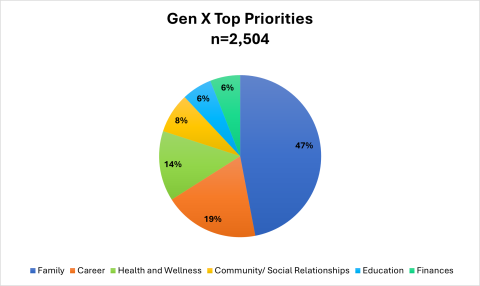Generation X... "The Forgotten Generation"
Generation X, a population of about 65 million, is often referred to as the 'forgotten' generation due to the larger baby boomer and millennial generations. They were also dubbed the "latchkey" generation as they were often left unsupervised at home or after school until their parents came home from work. This was due to increased numbers of dual income households and parental divorce. Gen Xers were born in 1965-1980 and are currently 44-59 years old. Some members of this group are approaching retirement while others are mid-career.1 According to the PEW Research Center (2019), this generation is more racially and ethnically diverse compared to other generations (39%) as well as more Gen X women entered higher education and the labor force compared to boomers at the same age. Understanding the Gen X experience, trends and attitudes is key because by 2028, this demographic shift will outnumber baby boomers.2
Defining moments for GEN X youth and young adulthood:
- Civil Rights
- Vietnam War
- Watergate
- Moon Landing
- AIDS epidemic
- MTV Debuts
- Chernobyl and Challenger Disasters
- Fall of the Berlin Wall and Soviet Union
- Apartheid ends
- Household Computer access and Internet technology.
Mathers Institute is currently conducting a five-year study on Generation X. The first-year results have concluded that family, career, health and wellness, community, education and finances are the top life priorities for Gen Xers2:
Family
Lower levels of wealth and interest rates, rising costs of health care, education and housing make it nearly impossible to maintain the same consumption patterns as their parents. Generation X has reached the age when they are supporting and educating children while also providing care for aging parents.3
- 66% are very satisfied with family life.
- 76% agree/strongly agree they have friends they value spending time with.
- 80% have meaningful relationships.
- 34% report that family is a source of stress.
- 29% reported feeling lonely some of the time or often.2
The sandwich generation causes additional stress by juggling many responsibilities from caregiving of children to aging parents.
- 50% of Gen Xers in their 40s and 33% in their 50s are a segment of the sandwich generation.
- 38% are raising at least 1 child and 20% are financially supporting an adult child.
- 67% have one parent aged 65+.
- 51% of Gen Xers report feeling stressed often by finances, while 81% are stressed about finances sometimes.2
In the pie chart below Gen X Top Priorities, n=2,504
47% Family, 19% Career, 14% Health and Wellness, 8% Community/Social Relationships, 6% Education, and 6% Finances

 Career
Career
Retirement is dissimilar to Gen Xers than for their parents. Once common pension plans have been replaced with contribution plans such as 401(k). According to a report by Transamerica Center, 17% of Gen X workers feel "very" confident to retire comfortably, while 80% are concerned Social Security will not be available and 40% plan to retire after age 70, or do not expect to retire at all. This generation is on the pathway to becoming the first generation to be worse off in terms of being prepared for retirement than their parents.4
- 60% of Gen Xers agree/strongly agree that they are satisfied with their work/life balance.
- About 30% reported experience in both frequent stress and burnout.
- One third of Gen Xers expressed that they are financially prepared to support their aging parents' needs.
- Gen Xers benefit from holisitc wellness programs, stress management, legal and financial advisors in the workplace.2
Health and Wellness
Gen Xers are notably satisfied with their life, health and career, but consistently battle with various sources of stress. Gen Xers are making significant contributions to shaping their families and communities and will hold critical leadership positions for many years.
- 2 out of 5 Gen Xers state that self-care is important but aren't able to participate as much in self-care as they need.
- 33% report feeling stressed out about their physical and mental health.
- Around 55% engage regularly in eating nutritious food, exercising, having a positive life outlook and getting enough sleep.
- Almost 50% of Gen Xers are very satisfied with their health.
- Gen Xers are concerned with finances, cognitive decline, poor physical health and losing independence.2
Gen Xers have less time to prioritize their own health and self-care.
To learn more about the Mather Institute Research Project on the GEN Xperience: "The Gen X Experience Year 1 Report, 2024"
References:
- Statista. "Resident Population in the United States in 2022, by Generation"
- Mather Institute. "The Gen X Experience Year 1 Report, 2024"
- Experian. "Experian Study: Average U.S. Consumer Debt and Statistics"
- Transamerica Center. ""Post-Pandemic Realities: The Retirement Outlook of the Multigenerational Workforce"
Check Out Our New Health & Well-Being Page
Our specialists help create healthy people and healthy places in New Hampshire.
Featured LINK
Mental Health Resources for New Hampshire - a printable county-specific guide to help New Hampshire residents find local, state, and national mental health resources.

